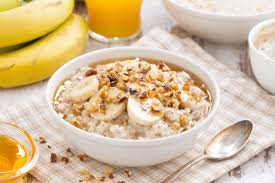.jpeg)
Sugar is a ubiquitous ingredient found in many foods, both healthy and not-so-healthy. While we know about obvious sugary treats like candy and soda, other foods are surprisingly high in sugar. Consuming too much sugar can lead to various health issues such as weight gain, increased risk of diabetes, and heart disease. Let’s take a closer look at 10 foods that might have higher sugar content than you expect, so you can make more informed dietary choices.
.jpeg)
1. Flavored Yogurt
.jpeg)
Yogurt is often thought of as a healthy choice, but flavored yogurts can be packed with added sugars. While plain yogurt is a great source of probiotics and calcium, flavored varieties often contain 15-20 grams of sugar per serving—sometimes even more than a sugary snack.
- Tip: Opt for plain Greek yogurt and add fresh fruit for natural sweetness.
2. Breakfast Cereals
.jpeg)
Many breakfast cereals, especially those marketed to children, are loaded with sugar. Even "healthy" cereals like granola or bran flakes can contain up to 12 grams of sugar per serving.
- Tip: Look for cereals with less than 5 grams of sugar per serving, or make your own at home using oats, nuts, and dried fruits.
3. Store-Bought Fruit Juices
.jpeg)
Fruit juices may seem like a healthy choice, but many are packed with added sugars. A 12-ounce serving of juice can have as much as 30-40 grams of sugar, which is nearly double the daily recommended intake for adults.
- Tip: Choose 100% pure fruit juice with no added sugars or opt for freshly squeezed juice at home.
4. Energy Bars
.jpeg)
Energy bars are marketed as a healthy, on-the-go snack, but many of them contain a surprising amount of sugar. Some bars, especially those with chocolate or caramel coatings, can have up to 20 grams of sugar per serving.
- Tip: Look for bars with 5 grams or less of sugar, or make your own using nuts, seeds, and natural sweeteners like honey or maple syrup.
5. Sauces and Condiments
Ketchup, barbecue sauce, salad dressings, and other condiments often have added sugars to enhance their flavor. For instance, just two tablespoons of ketchup can contain 4 grams of sugar.
- Tip: Choose low-sugar or homemade alternatives to condiments. You can make your own ketchup or salad dressing using fresh ingredients without all the added sugars.
6. Dried Fruits
While dried fruits like raisins, apricots, and figs are nutritious and packed with fiber, they also have concentrated sugar content due to the drying process. A small handful of raisins, for example, can have around 20 grams of sugar.
- Tip: Enjoy dried fruits in moderation, or opt for fresh fruits with lower sugar content when you can.
7. Flavored Coffee Drinks
Those fancy coffee drinks from your local café—like lattes, frappuccinos, or flavored iced coffees—often contain as much sugar as a dessert. A grande caramel frappuccino from a popular coffee chain can have up to 50 grams of sugar.
- Tip: Opt for a black coffee or an unsweetened latte, or ask for less syrup when ordering a flavored coffee drink.
8. Canned Fruit
Canned fruits, especially those in syrup, can be extremely high in sugar. While fruit is naturally sweet, the added syrup can elevate the sugar content to over 30 grams per serving.
- Tip: Choose fruits packed in water or their own juice, or better yet, enjoy fresh or frozen fruit without any added sugar.
9. Baked Goods
.jpeg)
Baked goods like muffins, pastries, and cakes are often loaded with sugar and refined flour. A single muffin can contain as much as 25-30 grams of sugar, and that’s before adding any frosting or glaze.
- Tip: If you crave baked goods, try making your own at home with less sugar, whole grains, and healthier fats. Or, look for healthier alternatives at the store with lower sugar content.
10. Sweetened Plant-Based Milk
Plant-based milk alternatives like almond milk, soy milk, and oat milk are often sweetened with added sugar, which increases their overall sugar content. Some sweetened versions of plant-based milk can have up to 15 grams of sugar per cup.
- Tip: Choose unsweetened versions of plant-based milk to avoid added sugars, or check the labels for lower-sugar options.
Why It's Important to Be Mindful of Sugar Intake
Excessive sugar intake is linked to numerous health problems, including:
- Weight Gain: Sugar provides empty calories that contribute to weight gain without offering essential nutrients.
- Diabetes Risk: A diet high in sugar can increase your risk of developing type 2 diabetes by affecting insulin sensitivity.
- Heart Disease: High sugar intake is associated with an increased risk of heart disease due to its effects on blood pressure, inflammation, and cholesterol levels.
- Tooth Decay: Sugary foods and drinks contribute to cavities by promoting bacterial growth in the mouth.
The Bottom Line
Sugar hides in many of the foods we eat, often in places we don’t expect. By being mindful of foods that contain higher sugar content, you can make healthier choices and avoid the negative health effects of excessive sugar consumption. Always check labels, opt for whole, unprocessed foods when possible, and limit your intake of sugary snacks and drinks. Your body—and your taste buds—will thank you!
